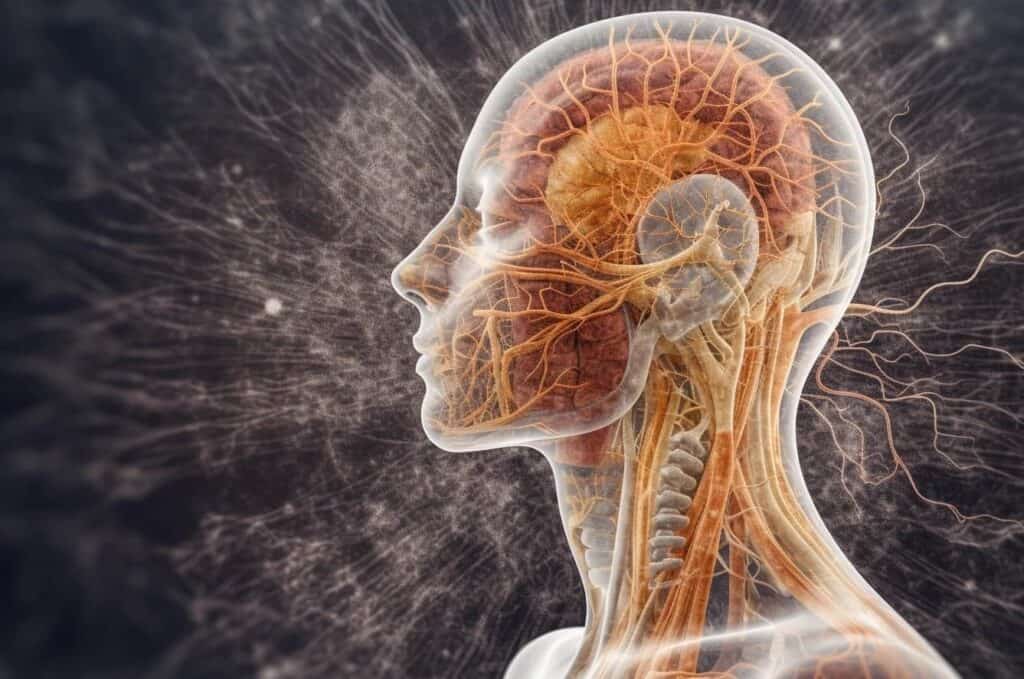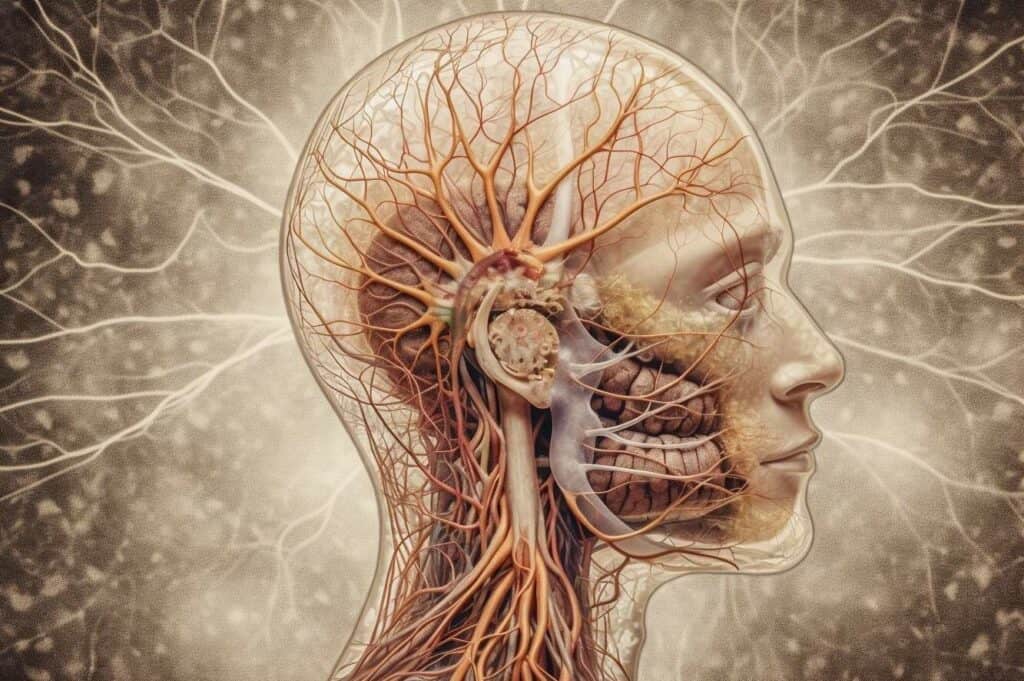IBS, SIBO, and GERD are all digestive tract disorders. There is no specific cause for any of these conditions, although medical experts believe that there are a number of underlying conditions that can exacerbate the symptoms.
One way that many people suffering from these conditions choose to treat them is by activating the vagus nerve. This is part of your nervous system and connects the brain to the gastrointestinal GI tract.
- Related: Discovering Gut Health Basics
What is the Vagus Nerve?
The vagus nerve is one of 12 cranial nerves found in the body. These nerves are grouped into pairs and their primary function is to link the brain to the rest of the body. These nerves are numbered using Roman numerals, and the vagus nerve is also called cranial nerve X.
These cranial nerves have sensory or motor functions, and some (such as the vagus nerve) have both. Sensory nerves send signals about smells, tastes, sounds, and sights to the brain. Motor nerves control the movement of muscles and the function of some glands within the body.
The Latin word vagus translates to wandering, which is appropriate as the vagus nerve is the longest of them all. It begins in the brain and ends in the colon. The vagus nerve has somatic and visceral components. Somatic sensations are felt in the muscles and skin, while visceral sensations are felt in the internal organs.

What Does the Vagus Nerve Do?
The sensory functions of the vagus nerve provide touch information about the skin located behind your ears, the exterior of the ear canal, and specific regions of the throat.
The nerve plays a small, but important role in the taste region near the back of the tongue. It is also used to supply visceral information from the esophagus, larynx, trachea, heart, lungs, and digestive tract.
The vagus nerve has motor functions too. It is used to stimulate the muscles in the larynx, pharynx, and soft palate which are involved with speaking and swallowing. It helps to stimulate the heart muscles, working to reduce the resting heart rate.
It can also stimulate involuntary contractions in the digestive tract. This can encompass the esophagus, stomach, and small and large intestines and helps to propel food through your body.
The Gut-Brain Axis And Its Connection To Digestive Health
The gut-brain axis is a complex and dynamic communication network that links the central nervous system (CNS) with the enteric nervous system (ENS).
The ENS comprises millions of neurons embedded in the walls of the gastrointestinal tract, which regulate digestion, absorption, and elimination. The CNS controls these processes through various pathways that involve hormones, neurotransmitters, and immune cells.
Recent research has shown that the gut microbiome plays a crucial role in maintaining emotional well-being and cognitive function. Dysbiosis or imbalance in gut microbial composition can lead to various psychiatric disorders such as depression and anxiety.
Conversely, probiotics have been found to alleviate symptoms of stress-related conditions by modulating the production of neurochemicals such as serotonin and dopamine.
The brain-gut connection is bidirectional, meaning that signals from both directions influence each other’s activity. For example, psychological stress can cause physical discomfort or pain in the digestive tract due to increased sensitivity to visceral stimuli.
Similarly, disturbances in gut motility or secretion can affect mood and behavior via feedback loops between the ENS and CNS.
Understanding this intricate interplay between neural circuits and gut physiology is essential for developing effective therapies for gastrointestinal diseases.
The Parasympathetic Nervous System
The parasympathetic nervous system is part of the autonomic nervous system that helps with the maintenance of the heart rate and digestion.
The vagus nerve is a key part of this system. It helps maintain cardiovascular health, respiration, immunity, detoxification, speech, swallowing, and sweating.
An increase in your vagal tone helps to reduce overall inflammation, increases the resistance of your immune system, and reduces your overall stress levels. It is also believed to have a positive effect on IBS.
A decreased vagal tone is linked to poor or improper digestion as your gut motility will be reduced and your stomach will take longer to empty. It is also associated with a raised blood pressure, increased heart rate, heightened stress levels, and cognitive impairment.
The Sympathetic Nervous System
Where the parasympathetic nervous system is known for its ‘rest and digest’ properties, the sympathetic is known for its ‘fight or flight’ activities. The adrenal glands are used to secrete the stress hormones adrenaline and cortisol.
Historically this response was used to help hunters flee from predators, however, this response can be over-stimulated in modern life.
When this response is triggered, our gut physiology is altered and the body’s ability to digest food is greatly inhibited. This is because the stress response shuts down the digestive system, so more energy is available for “fight and flight.”
This means that production of digestive enzymes and stomach acid are reduced. Ingested food cannot be properly metabolized, causing pain and bloating.
High cortisol levels reduce secretory IgA, part of the immune system which is present in the intestinal lining. Low levels of IgA can lead to lots of pathogenic bacteria reproducing and growing in your gut. This can then have an impact on IBS, autoimmune diseases, and mental health, to name a few.
The Importance Of The Vagus Nerve In Regulating Bodily Functions
The vagus nerve is a major component of the parasympathetic nervous system and plays a fundamental role in many bodily functions, including digestion, heart rate, and immune response.
Studies have shown that the vagus nerve helps to regulate the digestive process by stimulating the release of stomach acid, bile, and enzymes that are essential for food breakdown and absorption.
The vagus nerve is also responsible for controlling the heart rate by sending signals to the sinoatrial node, the heart’s natural pacemaker.
Lastly, the vagus nerve plays a crucial role in the body’s immune response by stimulating the production of cytokines, which are molecules that help regulate the body’s inflammatory response.
The vagus nerve is a complex system that helps balance many bodily functions. As such, stimulating the vagus nerve can have beneficial effects on digestion, heart rate, and immune response.

How Does the Vagus Nerve Influence Digestion?
The vagus nerve is active when the body is in a parasympathetic or ‘rest and digest’ state. The vagus nerve helps the stomach to churn and break down food and create acid.
When the vagus nerve is not functioning correctly or has sustained damage, you will notice impacts to digestion. The stomach acid levels will drop and there will be a great reduction in the production of enzymes.
This means that digestion will be poor and can result in conditions like gastroparesis, where the stomach slows down and does not empty appropriately, leading to fullness, nausea, vomiting and acid reflux.
This nerve also helps the liver and pancreas to function adequately. The liver uses the vagus nerve to help create and transport bile to aid with the digestion of fats.
The vagus nerve helps the pancreas to produce the enzymes used to digest carbohydrates, protein, and fats. It is also necessary to balance the blood sugar through the production and use of insulin and glucagon.
The vagus nerve also helps to stimulate the muscles of both the small and large intestines. This pushes food and other waste products through the digestive tract and out of your body.
The vagus nerve serves as a communication pathway for the gut microbiome. This allows the gut to communicate with the brain about the overall health of the digestive system.
Role Of Vagus Nerve In Heart Rate
The vagus nerve is a crucial component of the autonomic nervous system that plays a vital role in regulating various bodily functions, including heart rate.
The proper functioning of this nerve is essential for maintaining optimal cardiovascular health.
The vagus nerve’s primary responsibility regarding heart rate regulation is to slow down the heartbeat and keep it within a healthy range.
Vagus nerve stimulation techniques have been found to be effective in improving heart rate variability (HRV), which is an important indicator of overall cardiovascular health.
These methods include deep breathing exercises, biofeedback training, meditation, and acupuncture.
By activating the vagus nerve through these techniques, individuals can improve their HRV and potentially decrease their risk of developing cardiovascular disease.
Understanding the role of the vagus nerve in heart rate regulation is critical to promoting optimal cardiovascular health.
Role Of Vagus Nerve In Immune Response
When it comes to immune response, the vagus nerve has been found to have anti-inflammatory effects that can help reduce inflammation throughout the body. This is because when the vagus nerve is activated, it releases neurotransmitters such as acetylcholine that inhibit the production of pro-inflammatory cytokines.
Several studies have shown that stimulating the vagus nerve can be an effective way to alleviate symptoms associated with autoimmune disorders.
For example, rheumatoid arthritis patients who received electrical stimulation of their vagus nerve showed significant improvements in joint pain and stiffness compared to those who did not receive stimulation.
Similarly, inflammatory bowel disease patients who underwent non-invasive transcutaneous vagal nerve stimulation experienced reduced inflammation levels and improved quality of life.
Overall, understanding the role of the vagus nerve in inflammation and autoimmunity is critical for promoting optimal health outcomes.
Incorporating techniques that stimulate this nerve, such as deep breathing exercises or acupuncture, may help regulate immune responses and potentially reduce the risk of developing chronic inflammatory conditions.
How Do You Activate the Vagus Nerve?
Several contributors to poor vagus nerve function include fatigue, stress, and general feelings of being overwhelmed/anxious.
Recent studies suggest that activation of the Vagus Nerve could be an effective way to improve gut health by reducing inflammation and increasing motility. Some recent research suggests that stimulating this nerve may help treat conditions like depression or anxiety and improve overall well-being.
These feelings keep your body in a sympathetic state, where everything is tense and on edge. Activating the vagus nerve has been known to reduce anxiety and return your body to a parasympathetic state.

1. Eat Mindfully
One of the best ways to activate your vagus nerve is to eat mindfully. This means that you should eat slowly, taking your time. This may seem like overkill, but it is actually very good advice.
This allows your food to break down as much as it can in your mouth through mastication (chewing). Saliva also contains an enzyme, amylase, which helps to break down food in your mouth.
2. Breathe Deeply
Deep, relaxing breathing is believed to activate the vagus nerve. This prompts the body to start the relaxation response or parasympathetic state.
The average person takes between 10 and 15 breaths each minute. Try to slow this down to about 6 to fully relax your body.
Breathe deeply in through your nose for a count of 4, and then exhale through the mouth for a count of 6. There are even smartphones and watch apps that can help guide you with this!
- Learn more about IBS Alternative Treatments
3. Take a Cold Shower
Cold showers can also activate the vagus nerve. The exposure to cold water can be a stressful thought, but in actuality, it will improve your stress response and reduce your overall anxiety.
If a cold shower seems too hard to face, simply splash your face or quickly blast your body at the end of your shower.
4. Play Music
As we mentioned before, the vagus nerve is linked to the back of the throat. This means that it can be activated by chanting, humming, singing, and gargling.
These sounds trigger the activation of the muscles and vocal cords, which work through the vagus nerve. Playing instruments, particularly wind instruments, has been shown to activate the vagus nerve.
5. Meditate
Meditation is seen as a cure-all, but the focus on mindfulness and breathing can go a long way in managing a multitude of health conditions. The calming effect of meditation can activate the vagus nerve and will reduce your overall stress and anxiety levels.
6. Yoga
Yoga can be used in a similar manner to improve your mood and reduce stress levels. Again, there is a large importance placed on mindfulness and breathwork.
It has also been shown to increase the levels of a neurotransmitter known as GABA. This stands for gamma-aminobutyric acid and can help to stimulate the fibers of the vagus nerve.
7. Low to Medium Impact Exercise
If yoga is not your cup of tea, we advise trying out another form of low to medium impact exercise like walking or swimming.
This helps to stimulate the movement and function of the digestive system, including the vagus nerve. Any form of exercise like this will serve to reduce your stress levels too.
8. Massage or Acupuncture
You may also consider getting a massage or an acupuncture treatment. There are a number of acupuncture points known to stimulate vagus nerve function. The same applies to massages.
The carotid sinus (found on the right side of the neck) and the feet are believed to lower your blood pressure and heart rate when massaged. This has an effect of improving the function of your vagus nerve.
9. Increase Serotonin
Serotonin, a neurotransmitter, is known to activate the vagus nerve through receptors all around your body. Gut inflammation leads to a reduced level of serotonin production. This means that your vagus nerve can be slow or inactive.
There are a number of products available over the counter containing 5-HTP, also known as 5-hydroxytryptophan, a precursor to serotonin. This can help to support the serotonin production in the body and can help to activate the vagus nerve.
There are a few medications that can interact with 5-HTP, so it is always best to consult your doctor before you start taking the supplement.
10. Use Probiotics
Another way to activate your vagus nerve easily is to incorporate more probiotic foods and supplements into your diet.
This will help to balance and diversify the gut microbiome which can improve overall health and functionality of your body. The health of the microbiome is vital to the signaling in your enteric nervous system (signals between your gut and your brain).
The bacterial strain Lactobacillus rhamnosus supports the optimal levels of the GABA receptors in the body. This is mediated by the vagus nerve. You should aim to consume 6 or more types of fibrous vegetables daily for optimal gut health.
11. Fish and Omega-3
Fish is also believed to improve the tone and activity of the vagus nerve. The omega-3 fatty acids in fish such as salmon help your body to enter the parasympathetic state. This increases the activity and tone of the vagus nerve.
There is some anecdotal evidence to suggest that intermittent fasting can have a positive impact on vagus nerve tone. It is advised to have a fasting period of between 8 and 14 hours. There is a huge amount of information on intermittent fasting available online.
Acupuncture Points for Vagus Nerve Stimulation
Neck Release Through Eyeball Movement
This activity uses the eyeball movement to activate the suboccipital muscles at the base of your skull and to pull the first 2 vertebrae into alignment.
Lie down on your back, interlock your fingers, and place your hands under your head. The back of your head should be cradled in your palms. Face forward, so that you are looking up at the sky or ceiling – you will need to hold this position throughout the exercise.
Move your eyeballs, and eyeballs only, to the right. Hold this position for 30 seconds to a minute. When you feel a yawn, a shift in your breathing pattern, a release, or a sense of relaxation, this means you can return to the starting position.
Repeat this process, only this time move your eyeballs to the left. You can repeat this exercise as many times as you wish. It is a great method to use if you have trouble falling asleep at night.
Zero-Point
This is considered to be the geometric center of the ear homunculus, where all 4 quadrants meet. It is revered for the grounding, relaxation, and centering influences it has on the body. It is often likened to the reset abilities of the Shen Men point, but with a renewed ability to focus.
Depending on the practitioner you visit, you will have acupuncture needles inserted into this point and left for 40 minutes. You will likely repeat this treatment up to 3 times a week for a number of weeks.

Vagus Nerve Stimulation Treatment
This is a medical therapy performed using electrical impulses. These are sent directly into the vagus nerve using a small device that is similar to a pacemaker.
The brain does not have direct involvement in this process and you should not be able to feel the electrical stimulation. Generally speaking, only patients with treatment-resistant depression or epilepsy are offered this treatment.
You cannot have vagus nerve stimulation treatment if you only have one of the pair of vagus nerves, or if you are undergoing other kinds of brain stimulation treatments.
Heart arrhythmias are also exclusionary factors. Dysautonomias, lung disorders, ulcers, hoarseness, and vasovagal syncope (fainting) also make you ineligible for this treatment method.
During the treatment, a neurosurgeon will place you under a general anesthetic for the outpatient procedure. Two small incisions are made, one on the upper left region of the chest and the other on the lower left side of the neck. The pulse generator is then inserted into the chest incision, while the wires are inserted into the neck incision.
The entire process should only take about 45 to 90 minutes. There is a small risk of infection as with all surgical procedures, and you will likely experience pain and inflammation at the sites of the incisions.
Approximately 4 weeks post-op the stimulator will be activated remotely from the doctor’s office. The device is continually operational and is programmed to turn on and off for set durations.
When activated, the signals will be sent via the vagus nerve to the brainstem and into the brain. Typically the device will remain controlled by a neurologist, but some people use a handheld magnet to tweak the signals.
Gut Directed Hypnotherapy
This is not for everyone but can be highly effective if you are open to the treatment method. There are specialist gut psychologists, but any hypnotist should be able to perform this treatment.
Gut hypnotherapy involves allowing yourself to become hypnotized by a trained and qualified professional. They will teach the brain to communicate more efficiently and can help to stimulate the vagus nerve.
What is IBS?
IBS is an acronym for irritable bowel syndrome, and it is a common condition that impacts the digestive system. It is estimated that it affects about 10 to 15% of the world’s population, and approximately double the number of women as men have the condition.
IBS is not a curable condition and after diagnosis, your treatment plan will center around managing the symptoms. It can have a large impact on your day-to-day life and can be very inconvenient to live with.
The exact cause of IBS is unknown, although there are several theories which may play a role in its development.
The most well studied theory is that IBS develops as a result of oversensitive nerves in your gut, due to a disorder that arises between the interaction of your brain and gut. It may also be impacted by the intestinal microbiome – the normal bacteria living in the gut.
What Are the Symptoms of IBS?
The symptoms and the severity of the symptoms can vary among IBS sufferers. Commonly, people with IBS will experience abdominal pain and cramping. These are known to be worse following a meal, particularly a large meal, and are often alleviated by having a bowel movement.
People with IBS are also likely to experience bloating alongside this pain. This is where your stomach is distended and feels uncomfortably full or tight. Read more about Tightness in Stomach.
Diarrhea and constipation are other common symptoms of IBS. Diarrhea is a watery or stool that is hard to control, or occurs too frequently.
Constipation is the opposite of diarrhea, with infrequent bowel movements or hard, pellet-like stools. You may struggle to pass bowel movements, needing to strain, and may feel like you haven’t fully emptied your bowels. Learn more in this article – Why Am I Always Constipated?
Other common symptoms include flatulence, trapped wind, and mucus in your stools. Backache, nausea, and fatigue are also common complaints in people with IBS.
You may also experience issues with passing urine, like constantly needing to urinate, have very sudden urges, or feel as though you are not fully emptying your bladder.
Worrisome symptoms, like bowel incontinence, unintentional rapid weight loss, or blood in the stool suggest that IBS may not be the only problem, and seeing a doctor is necessary.
What is SIBO?
SIBO stands for small intestine bacterial overgrowth. It is a serious condition caused by bacteria in the small intestine. These bacteria are not typically found in the small intestine and normally grow in other areas of the gut.
The displacement of the bacteria can result in fermentation of the food you are eating, which leads to excess gas, abdominal pain, diarrhea, and sometimes even malnutrition.
It can be triggered by an underlying condition, like prior abdominal surgery or antibiotic use. SIBO is a treatable condition but it is known to commonly recur in many patients.
It is important to seek medical attention if you believe you are suffering from SIBO as treatment may help eliminate your symptoms.
SIBO has also been associated with a number of different health conditions. These include viral gastroenteritis (a stomach bug), Celiac disease, Crohn’s disease, gastroparesis, and hypochlorhydria (low stomach acid levels).
Nerve damage, cirrhosis, portal hypertension, and IBS are other common comorbidities. Diabetes, scleroderma, HIV, Parkinson’s disease, and hypothyroidism are also linked to the condition.
Surgeries on the intestines, like bowel resection or gastric bypass, are also closely linked with the onset of SIBO. The use of medications such as narcotics that slow down the gut can also cause SIBO.
What Are the Symptoms of SIBO?
The symptoms of SIBO are often exacerbated by eating. You may notice pain after eating meals, accompanied by bloating, abdominal distension and cramps. You may also experience diarrhea, constipation, trapped gas, and indigestion.
You are likely to also feel full most of the time. Many complain that they feel like they look pregnant by the end of the day, but usually the stomach is flatter when they first wake in the morning.
Learn more about Indigestion Symptoms.
What is GERD?
GERD stands for gastroesophageal reflux disease. The esophagus is a long tube that connects your mouth to your stomach. With this condition, stomach acid travels into your esophagus regularly, leading to irritation – symptoms include heartburn (a burning sensation below your breast bone) or regurgitation (feeling like food or liquid comes back up to your throat).
GERD can often be managed with over-the-counter medications (antacids, H2 blockers, or proton pump inhibitors) and some simple lifestyle adaptations. In severe cases, prescription medical therapy or surgical intervention may be necessary.
Obesity is a leading contributing factor to the development of GERD. Pregnancy, connective tissue disorders such as scleroderma, a hiatal hernia, or a delay in the emptying of your stomach can also contribute to the development of GERD. A hiatal hernia is where the upper region of your stomach begins to bulge through your diaphragm into your chest cavity.
Smoking and eating large meals can exacerbate the symptoms of GERD, as can eating late at night. Some people notice that certain foods trigger GERD symptom flare-ups. These are commonly fried foods, citrus, tomato based foods, peppermint, chocolate, as well as alcohol and coffee. Not all of these foods trigger symptoms in every GERD sufferer.
What Are the Symptoms of GERD?
GERD will cause a burning feeling in your chest called heartburn. This is commonly felt after eating and tends to get worse in the evenings and nighttime. This may be accompanied by chest pain or discomfort with swallowing.
You may also notice yourself regurgitating sour liquids (likely acid or bile) or food that you have recently consumed.
In some cases, GERD can manifest with atypical symptoms, like chronic cough, hoarseness, interrupted sleep, or asthma, leading patients to first seek help from an ENT doctor or pulmonologist.
If you have shortness of breath, jaw pain, arm pain, or chest pain/tightness, these may be symptoms of a heart attack, and you should visit an emergency room immediately. Often women can experience atypical symptoms of a heart attack like nausea, vomiting or upper abdominal pain
If GERD is left untreated, complications can develop. Esophageal strictures are narrowings of the lower esophagus to the formation of scar tissue. This prevents you from swallowing properly as the acid has damaged the esophageal walls, so people often feel like food sticks on the way down.
Esophageal ulcers and esophagitis are other conditions that you may develop. This is essentially an open sore or irritation to the esophageal lining caused by the stomach acid. This can be very painful, make swallowing difficult, and can even cause bleeding (vomiting blood or dark, black stool). If this develops, see a doctor immediately.
You may also develop Barrett’s esophagus, where the acid damages the lower esophageal lining, and the lining becomes more like the typical intestinal lining rather than the esophageal lining.
This condition is strongly associated with an increased risk of developing esophageal cancer and needs regular surveillance with an endoscopy and biopsies to look for precancerous changes. Taking a proton pump inhibitor (acid reflux medication) daily can help reduce progression to esophageal cancer.
Sources:
- https://www.ncbi.nlm.nih.gov/pmc/articles/PMC5859128/
- https://www.ncbi.nlm.nih.gov/books/NBK537171/
- https://pubmed.ncbi.nlm.nih.gov/29593576/
- https://www.ncbi.nlm.nih.gov/pmc/articles/PMC4017164/
- https://www.ncbi.nlm.nih.gov/pmc/articles/PMC6189422/
- https://greatergood.berkeley.edu/video/item/secrets_of_the_vagus_nerve
- https://health.usf.edu/care/psychiatry/services-specialties/neurotherapy/vagal-nerve-stimulation
- https://news.cuanschutz.edu/news-stories/study-provides-better-insight-into-the-vagus-nerves-link-to-the-brain

